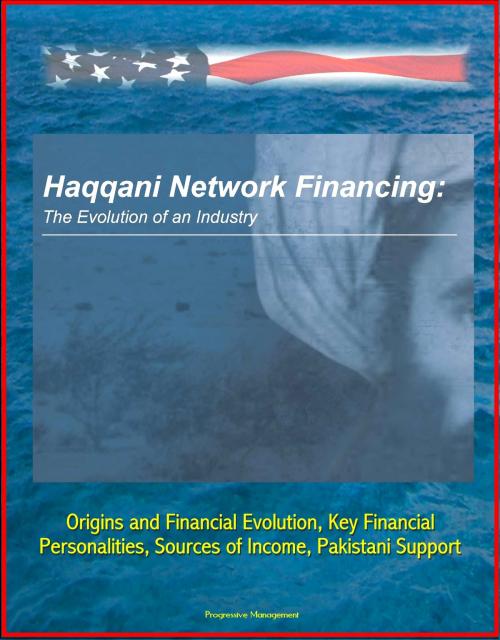Haqqani Network Financing: The Evolution of an Industry - Origins and Financial Evolution, Key Financial Personalities, Sources of Income, Pakistani Support
Nonfiction, Social & Cultural Studies, Political Science| Author: | Progressive Management | ISBN: | 9781301197781 |
| Publisher: | Progressive Management | Publication: | February 15, 2013 |
| Imprint: | Smashwords Edition | Language: | English |
| Author: | Progressive Management |
| ISBN: | 9781301197781 |
| Publisher: | Progressive Management |
| Publication: | February 15, 2013 |
| Imprint: | Smashwords Edition |
| Language: | English |
The purpose of this report is to understand and outline the financial architecture that sustains the Haqqani faction of the Afghan insurgency. The Haqqani network (hereafter "the network" or "the Haqqanis") is widely recognized as a semi-autonomous component of the Taliban and as the deadliest and most globally focused faction of that latter group. What gets far less attention is the fact that the Haqqanis also appear to be the most sophisticated and diversified from a financial standpoint. This report will illustrate that the Haqqani business portfolio mirrors a mafia operation, and illustrate why an understanding of the illicit business side of the network is critical to enriching our understanding of the group. In addition to raising funds from ideologically like-minded donors, an activity the Haqqanis have engaged in since the 1980s, information collected for this report indicates that over the past three decades they have penetrated key business sectors, including import-export, transport, real estate and construction in Afghanistan, Pakistan, the Arab Gulf and beyond. The Haqqanis employ violence and intimidation to extort legal firms and prominent community members, and engage in kidnap for ransom schemes. According to investigators, they protect and engage in the trafficking of narcotics and the precursor chemicals used to process heroin (although to a much lesser degree than other factions of the Afghan Taliban). The Haqqanis also appear to operate their own front companies, many of which appear to be directed at laundering illicit proceeds. The broad range of business activities in which the Haqqanis engage suggests that the pursuit of wealth and power may be just as important to network leaders as the Islamist and nationalistic ideals for which the Haqqanis claim to fight.
This report makes the case that, over three decades of war, the Haqqanis have evolved into an efficient, transnational jihadi industry, one which supports their war effort, and which is supported by it. There's no doubt that the Haqqani network needs to raise funds in order to support its war effort; it is also true that a continued war benefits the Haqqanis' current financial portfolio. The Haqqanis' capacity to raise funds from ideological supporters requires continued struggle, and their capacity to profit off key business activities, in particular extortion, kidnapping and smuggling, depends on a sustained state of insecurity and limited state influence. This suggests that network leaders could have a financial disincentive to ending the conflict through reconciliation.
Origins and Financial Evolution of the Haqqani Network * Key Financial Personalities and Organization post-2001 * Sources of Income * Donations * Pakistani Support * Illicit Activity * Licit Activity * Conclusion
The purpose of this report is to understand and outline the financial architecture that sustains the Haqqani faction of the Afghan insurgency. The Haqqani network (hereafter "the network" or "the Haqqanis") is widely recognized as a semi-autonomous component of the Taliban and as the deadliest and most globally focused faction of that latter group. What gets far less attention is the fact that the Haqqanis also appear to be the most sophisticated and diversified from a financial standpoint. This report will illustrate that the Haqqani business portfolio mirrors a mafia operation, and illustrate why an understanding of the illicit business side of the network is critical to enriching our understanding of the group. In addition to raising funds from ideologically like-minded donors, an activity the Haqqanis have engaged in since the 1980s, information collected for this report indicates that over the past three decades they have penetrated key business sectors, including import-export, transport, real estate and construction in Afghanistan, Pakistan, the Arab Gulf and beyond. The Haqqanis employ violence and intimidation to extort legal firms and prominent community members, and engage in kidnap for ransom schemes. According to investigators, they protect and engage in the trafficking of narcotics and the precursor chemicals used to process heroin (although to a much lesser degree than other factions of the Afghan Taliban). The Haqqanis also appear to operate their own front companies, many of which appear to be directed at laundering illicit proceeds. The broad range of business activities in which the Haqqanis engage suggests that the pursuit of wealth and power may be just as important to network leaders as the Islamist and nationalistic ideals for which the Haqqanis claim to fight.
This report makes the case that, over three decades of war, the Haqqanis have evolved into an efficient, transnational jihadi industry, one which supports their war effort, and which is supported by it. There's no doubt that the Haqqani network needs to raise funds in order to support its war effort; it is also true that a continued war benefits the Haqqanis' current financial portfolio. The Haqqanis' capacity to raise funds from ideological supporters requires continued struggle, and their capacity to profit off key business activities, in particular extortion, kidnapping and smuggling, depends on a sustained state of insecurity and limited state influence. This suggests that network leaders could have a financial disincentive to ending the conflict through reconciliation.
Origins and Financial Evolution of the Haqqani Network * Key Financial Personalities and Organization post-2001 * Sources of Income * Donations * Pakistani Support * Illicit Activity * Licit Activity * Conclusion















